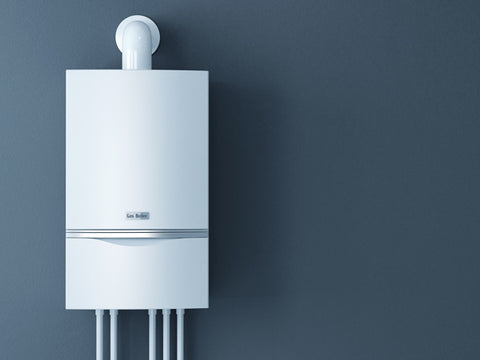The Different Types Of Water Heaters

If you are a homeowner or you own rental properties, you know better than most that appliances eventually need to be replaced. One of these is your water heater. When it's time to purchase a new one, you want a unit that will provide enough household hot water but do so in an efficient manner. Now, more than ever before, when it comes to water heaters, there are more options thanks to technological plumbing advancements. With all of the different types of water heaters to choose from, however, how do you make a good decision?
To better familiarize you with what's out there, let's take a look at various water heating systems/units.
Condensing Tankless Water Heaters
The Brigade Commercial HIgh-Efficiency Water Heater is a top-of-the-line condensing tankless water heater. What makes this type of water heater great is that they are more energy efficient and durable than a standard system. Whereas gas would ordinarily be expelled from the flue in a conventional water heater, here, hot exhaust gases are captured and utilized. At the base of the water heater, these gases are blown through a coil. Heat is absorbed by incoming cold water. For homes with gas, this is a highly efficient water heater.
Solar Water Heaters
These are exactly what you would expect them to be – water heaters that operate courtesy of solar (sunlight) power. Somewhere outside, there will be the need for solar panels – likely on the roof of the home. For sunny regions, these are ideal. They do, however, come with both advantages and disadvantages.
Heat Pump Water Heaters
You may also hear these referred to as hybrid electric water heaters. They transfer heat to the water by capturing it from the ground or the air. Compared to standard electric models, they cost more up front. But, an ROI from lower energy bills is achievable for homeowners because they use approximately 60% less energy than conventional water heaters.
OnDemand – Tankless Water Heaters
On-demand, these tankless water heaters use water filled coils and intense heat flashes to make water hot when you need it. Compared to the next type of water heater, they are far more efficient. Upfront costs, however, may be slightly higher.
if you have a big family and tend to use large amounts of heated water simultaneously, these are very suitable. In older homes, installation may require upgrades where electrical capacity, gas line diameter, and more are concerned. They will not, however, take up anywhere near the room that a conventional water heater takes up.
Conventional Water Heaters
The most common of all water heaters listed here, you may also hear this type of system referred to as a storage tank water heater. Until needed, a tank stores already heated water. High-efficiency models can cost less because they use less energy to operate, but they can run into higher costs (and difficulty) when it comes to installation. For one thing, they require a lot of room.
Through the years, to keep running effectively and efficiently, these water heaters require regular maintenance. To remove buildup and sediment, they must be drained and flushed annually. You can expect approximately 10 to 12 years of life from one of these models, depending on maintenance and care. There's a lot of wasted energy and money, however, due to standby heat loss.
How to Find the Perfect Water Heater
What kind of water heater would best suit your needs?
Do you want to save money on utility bills? Are you concerned about the carbon footprint your home is inflicting upon the world and the environment? At Water Heating Direct, we can help you find the most suitable water heater for your needs.
Contact us today for more information.

